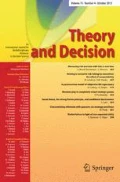Abstract
Özkal-Sanver (Theory Decis 59:193–205, 2005) studies stability and efficiency of partitions of agents in two-sided matching markets in which agents can form partitions by individual moves only, and a matching rule determines the matching in each coalition in a partition. In this study, we present the relationship between stability and efficiency of partitions that is analyzed for several matching rules and under various membership property rights codes, now allowing coalitional moves.
Similar content being viewed by others
References
Aşan G., Sanver M. R. (2003) Coalition structural games and the voluntary provision of public goods. In: Sertel M. R., Koray S. (eds) Advances in economic design. Springer, Heidelberg, pp 251–259
Bogomolnaia A., Jackson M. O. (2002) The stability of hedonic coalition structures. Games and Economic Behavior 38(2): 210–230
Conley J. P., Konishi H. (2002) Migration-proof Tiebout equilibrium: Existence and asymptotic efficiency. Journal of Public Economics 86: 243–262
Dreze J. H., Greenberg J. (1980) Hedonic coalitions: Optimality and stability. Econometrica 48(4): 987–1003
Eren, N. I. (1993). Coalition structural games and stability under membership property rights axioms, M.A. Thesis, Department of Economics, Boğaziçi University, İstanbul.
Gale D., Shapley L. S. (1962) College admission and the stability of marriage. The American Mathematical Monthly 69: 9–15
Greenberg J. (1977) Pure and local public goods: A game theoretic approach. In: Sandmo A. (eds) Public Finance. Heathand Co, Lexington, MA
Greenberg J., Weber S. (1986) Strong Tiebout equilibrium under restricted preferences domain. Journal of Economic Theory 28: 101–117
Koray, S., Yıldız, K. (2008). Implemantation via code of rights, M.A. Thesis, Department of Economics, Bilkent University, Ankara.
Özkal-Sanver İ. (2005) Stability and efficiency of partitions in matching problems. Theory and Decision 59: 193–205
Sertel M. R. (1982) Workers and incentives. North-Holland, Amsterdam
Sertel M. R. (1992) Membership property rights, efficiency and stability. Boğaziçi University Research Papers, İstanbul
Sertel, M. R. (1998). Designing rights: Invisible Hand and Decentralizability Theorems. In ASSET lecture delivered at the annual meeting of ASSET in Bologna.
Author information
Authors and Affiliations
Corresponding author
Additional information
A preliminary version of this paper has been presented at the Eighth International Meeting of the Association for Public Economic Theory, 6–8 July 2007, Nashville; and at the Ninth International Meeting of the Society for Social Choice and Welfare, 19–22 June 2008, Montreal. We thank to participants for several useful comments. This work is part of the project # 107K560 supported by the Scientific and Technological Research Council of Turkey (TUBITAK).
A preliminary version of this manuscript was part of the Nizamogullari’s master thesis at Department of Economics, İstanbul Bilgi University.
Rights and permissions
About this article
Cite this article
Nizamogullari, D., Özkal-Sanver, İ. Coalitional stability and efficiency of partitions in matching problems. Theory Decis 71, 395–407 (2011). https://doi.org/10.1007/s11238-010-9204-9
Published:
Issue Date:
DOI: https://doi.org/10.1007/s11238-010-9204-9



